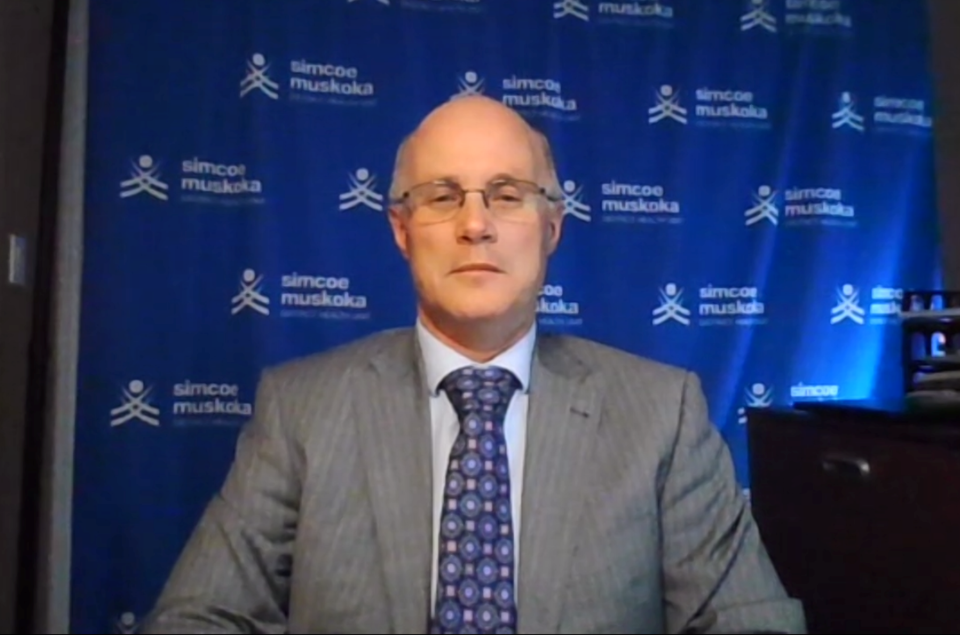Science may show outdoor gatherings can be safe with distancing and mask use, but those charged with enforcing public health measures are hesitant to encourage any gathering outside members of the same household.
A group of scientists and health experts who have been providing evidence-based advice to the provincial government throughout the COVID-19 pandemic has publicly stated outdoor gatherings and safe outdoor activities should be allowed.
This statement comes days after the province announced an outright ban on indoor and outdoor gatherings, and closed – then reopened – playgrounds.
The Simcoe Muskoka District Health Unit's medical officer of health, Dr. Charles Gardner, said he respects the science table, and supports outdoor activity. However, he said, making sure outdoor gatherings are safe is a difficult task.
“I agree outdoor activity is very important for people, and if we were able to maintain people being two metres apart, [gathering] could be done safely outdoors,” said Gardner. “But messaging alone is not sufficient for influencing people’s behaviour.”
The doctor recalled working with municipal staff last summer in coming up with ways to regulate gatherings on beaches and in parks.
Some towns painted circles in parks to encourage people to maintain a two-metre distance with anyone outside of their household.
Currently, all gatherings indoors and outdoors are banned by the provincial government’s stay-at-home order.
But the science table argues people should be allowed to meet outside in small groups with masking and distancing in place.
The Ontario COVID-19 Science Advisory Table is made up of science and health experts who have been informing the Ontario government on evidence relevant to the COVID-19 pandemic.
It is an independent group hosted by the Dalla Lana School of Public Health. The table provides weekly summaries to the provincial government.
In the latest update, posted April 20, the science table provides a list of six things they say will reduce transmission and allow the province to reopen safely as soon as possible.
Included in the list of six items, the table urges a focus on “public health guidance that works.”
According to the table, that means prohibiting indoor gatherings, but allowing outdoor gatherings with people staying two metres apart, wearing masks, and keeping hands clean.
“Policies that discourage safe outdoor activity will not control COVID-19,” states the science table brief.
Further, the science team states discouraging outdoor activity disproportionately harms children and those without access to their own greenspace.
Dr. Gardner has been encouraging people to go outside and exercise, and noted the stay-at-home order lists exercise as an essential reason to leave your home.
He has, however, urged people not to have any close contact with anyone outside of their household - even outside.
“I have the highest opinion of the science advisory table,” said Gardner. “They’ve been absolutely essential in their work.”
In the region, Gardner said people have not been using masks when gathering outdoors.
There’s also been an increase in community transmission cases to account for about 30 per cent of all new cases in the region. A community transmission case is one without a known link to any other case or outbreak, meaning the health unit doesn’t know how the transmission happened.
Gardner said he is concerned community-acquired cases could increase further without strict measures prohibiting gatherings.
“The question of how exactly you manage outdoor exposure at this time is up for debate,” said Gardner. “I think we need a comprehensive approach that restricts the amount of up-close, personal interaction people have outside their households.”
One other transmission-reducing action posted by the science table states essential workers should be paid to stay home when they are sick, exposed or need time to get vaccinated.
Gardner has also called for the province to offer paid sick leave, noting it is one of the keys in preventing workplace transmission.
“I think that’s a critical point,” said Gardner.
The table also suggests only “truly essential workplaces” should stay open, noting the list of what stays open should be as short as possible.
In Simcoe-Muskoka, Gardner confirmed there were 11 new workplace outbreaks reported in the last seven days.
“We know there were lapses in compliance with legislative requirements,” he said of some of the workplace outbreaks in the region.
In Peel and Toronto, the local medical officers of health have issued orders requiring workplaces with five or more confirmed cases of COVID-19 in staff to close for several days.
While Gardner said he needs to “consider all ideas” about ways others are attempting to curb the spread of COVID in the workplace, he also noted it was difficult for an area medical officer of health to decide what is or isn’t a “truly essential” workplace in their region.
The final two recommendations from the science table include accelerating the vaccination of essential workers and those who live in hot spots and limiting mobility for everyone in the province.
"Simply put, Ontarians need to stay in their local communities," states the brief.
You can read the science table brief here.
